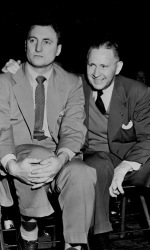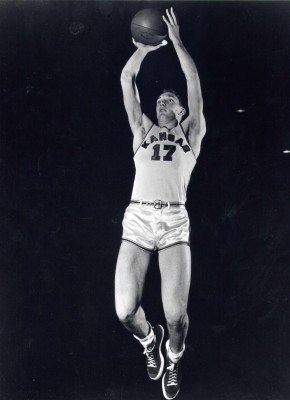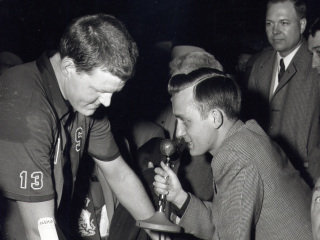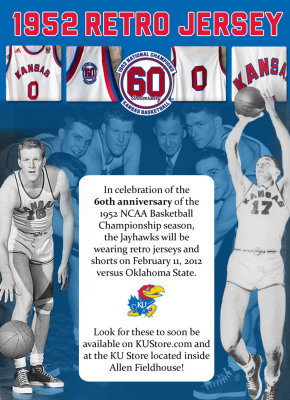Remembering KU's First NCAA Championship Team
Feb. 9, 2012
Led by legendary head coach ‘Phog’ Allen, the 1952 Kansas squad captured the school’s first NCAA title, and in the process, the nation’s attention. This Saturday, members from that team will come back to Lawrence for its 60th anniversary celebration during KU’s game versus Oklahoma State.
As the 17 members of KU’s first ever NCAA title team arrived back in Lawrence to a large gathering of adoring fans, legendary coach Forrest ‘Phog’ Allen kept his players grounded, by emphatically telling them, “Now, everyone one of you… do not miss class tomorrow!”
Former KU guard Bill Hougland remembered that he obeyed his coach’s wishes the next day, but was surprised that no one else did.
“We all went to school the next day, but there was hardly anybody in the classroom,” the now 82-year old remembered. “In several of my classes there were only about two of us in there.”
For Hougland and the rest of his teammates, the light class load on March 27, 1952 served as a reward for their climb to the top of college basketball’s mountain, known as the NCAA Tournament.
That long journey began four years earlier when a crop of Kansas boys met up with a Hoosier known as Clyde Lovellette on the Jayhawk freshman squad.
“Back in those days you could not play as a freshman,” recalled Lovellette. “That first year was spent as a scrub against the varsity squad, trying to get them better to win. Once you got into your sophomore year, you were playing for something.”
Lovellette, a towering center from Petersburg, Ind., began that climb to the nation’s elite in 1949, when his team mustered a 14-11 record en route to an NCAA appearance. The following year, Kansas would earn a 16-8 mark, but the two seasons were mere dress rehearsals for what the 1951-52 campaign had in store for the crowd inside Hoch Auditorium.
“When the time was right, everything fell into place,” Lovellette recalled. “We played for the moment and I think the moment was each game. We went out and gave 110 percent, everybody on the squad did.”
Perhaps the reason each member of that 51-’52 team gave it their all was because they believed in what their coach had told them four years earlier.
 “He (Allen) told me we would win the national championship in ’52 and we would also go to the Olympics and win the gold medal,” Lovellette remembered about an initial visit with the ‘Father of Basketball Coaching’. “I did not know much about religion at that time, but I knew prophets could predict what was going to happen, so apparently he was one of those.”
“He (Allen) told me we would win the national championship in ’52 and we would also go to the Olympics and win the gold medal,” Lovellette remembered about an initial visit with the ‘Father of Basketball Coaching’. “I did not know much about religion at that time, but I knew prophets could predict what was going to happen, so apparently he was one of those.”
But KU’s storybook ride did not come without its fair share of speed bumps, the last of which would surface during the team’s 1950-51 season.
“We went down to Kentucky and got beat bad,” Houglund remembered. “I think from that point on we were more focused. We had a good team that year, but they just killed us.”
Following the team’s 68-39 loss in Lexington, Hougland described his team as closer and more conscious of the goal at hand.
“From that point on, things started turning around for us,” Hougland said.
After that drubbing at the hands of another Allen disciple, Adolph Rupp, and Kentucky, KU would lose just nine more games between, Dec. 19, 1950 and March 26, 1952, when the Jayhawks brought home the NCAA title.
“We had a nucleus on that ballclub that loved to play together,” Lovellette said. “And I think they were an unselfish group of individuals that were on the 1952 squad.”
Even as unselfish as the players might have been individually, the Jayhawk team still needed some guidance as a whole during its championship run. Fortunately for those 17 young men, they had two strong coaching figures in ‘Phog’ Allen and coach assistant, Dick Harp.
“The kids will tell you that Dick Harp played a huge role in the success of that team,” explained longtime Kansas broadcaster Max Falkenstien. “But Doc (Allen) was a great motivator, who would talk to the team before they took the floor and tell them some tale from the past.”
Hougland agreed with Falkenstien’s assessment of Harp’s role, as he explained, “Doc Allen was really the figure head at that stage of his life. He was the coach every day, but Dick was the one who kind of put the pieces all together and made us a cohesive team.”
Regardless where the two sat in the coaching hierarchy, they would be on the bench for the greatest KU basketball season in nearly 30 years, as the Jayhawks steamrolled to a 24-2 record by the conclusion 1951-52 regular season.
The Big Seven Conference champions would defeat TCU 68-64, and St. Louis 74-55, in Kansas City during the NCAA Tournament’s first and second rounds. The following week, they prevailed over Santa Clara by the same 74-55 score in Seattle at the national semi-final.
“We played every game as if it were our last for KU,” Lovellette recalled. “I don’t care which teams were in that Final Four, whether it would have been Kentucky, Illinois or whoever, we could have beaten them.”
The Jayhawks’ opponent in the national championship the very next day would not be the Wildcats or the Illini, but instead, the game pitted Kansas against the Redmen of St. John’s. Although players themselves would feel some the intense pressure of that title game, the man behind the microphone during the contest knew, he too, would be counted upon to deliver during one of the biggest games in Kansas men’s basketball program history.
“Those were really the pre-TV days, so my radio broadcast of the game was really the only source for fans to find out what was going on,” Falkenstien explained. “The game occurred around midnight Central Standard Time, with the game being played in Seattle. But we had a huge audience regardless and it was a momentous moment for me in my career, and I was pretty young at the time.”
It would most definitely be a night to remember for Falkenstien and the rest of the Jayhawks as they sent St. John’s back to the Big Apple on the wrong side of an 80-63 score. Despite being crowned national champions, Hougland and his teammates did not feel the need for all the pomp and circumstance that surrounds current collegiate champions.
“Things were different then because there was not a great interest in the national championship,” Hougland explained. “There was not a lot of television in those days and they sure didn’t hype it up like they do today. So our motivation was just to win because we wanted to win every game, and Doc kept that goal in our minds all the time.”
Even though the team may have not been overly impressed with its achievement, the KU faithful sure was, and decided to show its appreciation upon the team’s arrival back into town the next day.
 “We came across the bridge that night and the crowd was there,” Hougland recalled. “I think that shocked all of us because we did not have any idea that was going to happen. Who would have ever thought that there were going to be a lot of cars on the street after you win a basketball game? So I think it probably stood out to us more at that point because of what it meant to a lot of people.”
“We came across the bridge that night and the crowd was there,” Hougland recalled. “I think that shocked all of us because we did not have any idea that was going to happen. Who would have ever thought that there were going to be a lot of cars on the street after you win a basketball game? So I think it probably stood out to us more at that point because of what it meant to a lot of people.”
Sixty years later, KU’s first NCAA title still means something to its fans as members from the 1952 squad will be honored at halftime during Saturday’s Oklahoma State game at Allen Fieldhouse. To commemorate the anniversary KU’s 2011-12 players will be wearing throwback jerseys modeled after the style Phog Allen’s bunch wore during the early 1950s.
“I think it’s nice and is a great compliment to our group,” Hougland said. “You feel more of this (feeling of achievement) the older you get. You look back at the times you had; it is great feeling.”
Hougland still has his pair of his shorts from his playing days, but knows today’s uniforms have become lighter and longer.
“We had red wool warm-ups, and when we got out of school we were able to keep them if we wanted them,” he observed. “Some guys didn’t want them and never put them on again because they were too heavy.”
While seven members of the 1952 national championship team will be able to take home some tangible souvenirs on Saturday, it’s those precious mementos in their hearts that will mean the most, like the warm reception from the 16,300 fans inside the building named for their beloved coach. 
Throwback Thursday: Clyde Lovellette: http://www.kuathletics.com/sports/m-baskbl/spec-rel/020912aaa.html

